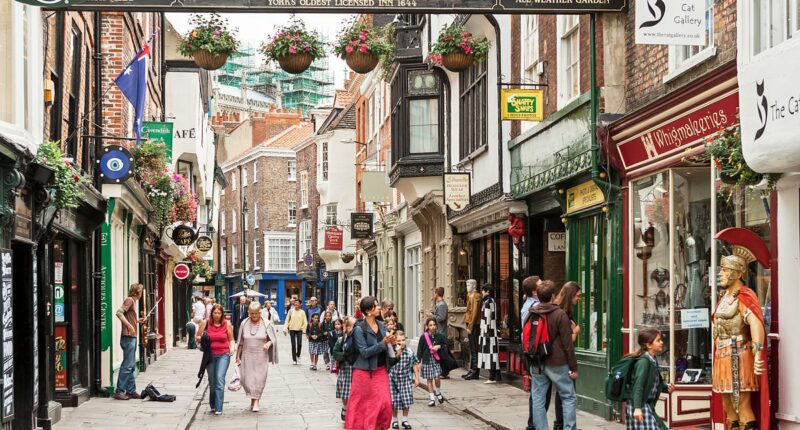Share this @internewscast.com
Historic York has long been renowned for its cobbled streets, iconic Minster and ancient Roman walls.
Now it has another claim to fame – as the most prosperous city in the country outside London.
The ancient city has topped a national index of urban growth prospect, beating heavyweight rivals like Manchester, Edinburgh and Bristol.
With unemployment at merely 1.6 percent, which is less than half the national average of 3.8 percent, York has been lauded for its ample job opportunities, highly skilled workforce, excellent transport connections, and bustling shopping districts.
This recognition is supported by impressive statistics, with York’s average annual salaries now at £41,400, according to Plumplot data, significantly surpassing the UK’s average wage of £37,430.
The city has experienced a robust recovery following Covid, largely due to its vibrant tourist industry, and in 2024, tourism spending exceeded £2 billion, marking a 5% increase from the previous year.
Yet, speak to the people who actually live there, and a mixed picture quickly emerges.
Many say they are struggling with the soaring cost of housing – the average home now costs £324,940 – as well as soaring rents.

Historic York has been crowned the most prosperous city in Britain after London

But when the Daily Mail spoke to residents this week, a different picture soon emerged

Despite his bubbly demeanor, lifelong York resident Shane Sayner, 47, told our reporter life in the city was as tough as the rest of the country
In July 2025, first-time homebuyers in York paid an average of £270,000, which is approximately £50,000 higher than the UK average. According to ONS data, renting a detached house typically costs around £1,467.
Asked if he felt prosperous, lifelong York resident Shane Sayner, 47, said: ‘Don’t make me laugh.
‘My bills have gone through the roof and plenty of locals can’t afford to buy or rent because the prices have gone through the roof.
‘People with ordinary jobs like me don’t have wages that can stretch that far.
‘Many properties are Airbnbs or student homes because the council have put tourists and students before their own residents.
‘Local families are having to move out of the city because there’s no suitable or affordable housing for them.’
Mr Sayner, a cleaner, was among several to accuse the council of prioritising tourists and students above the needs of residents.
He said: ‘I think if you’re a tourist coming to York you’ll have a great time.
‘But I don’t think the prosperity that their money brings really helps those who live here.
”The roads are riddled with potholes and the traffic jams are horrendous.’

The number of overnight stays in the city reached 1.7m in 2024 – with 9.4m annual visitors

But locals have long said the city’s overreliance on tourism has led to their high street being ‘consumed by tourist tat’
York rose to the top of the study ranking Britain’s 50 biggest cities outside London, conducted by Demos and PwC.
Various metrics, such as crime rates, property prices, income levels, quality of life, and education, were utilized to compile the league table, with York marking the most significant improvement among the top ten locations since 2021.
Visitors staying overnight in York reached 1.7m in 2024 – with 9.4m annual visitors.
Last year, the council unveiled plans to monetize this success through a European-style tourist tax, which would require visitors to pay an additional fee for each night spent in a hotel.
The extra cash could be used by the Labour-run council towards maintaining the city and preserving its historic attractions.
However, locals told Daily Mail that while they understood York’s reliance on tourism, some felt that they were being priced out of doorstep attractions.
Retired teacher Penny Forster said: ‘It’s all about tourist money.
‘We feel a bit like second class citizens. It costs so much to visit the museums, the art galleries and so on.
‘When you’re a tourist you will spend more because you’re on holiday. But when you live here, it’s very expensive.’
Ms Forster added: ‘York is still a good place to live. We could do with more police and a bit more appreciation that we do live here, and it’s not just tourists.’
York has the biggest visitor economy in Britain relative to its size and was also praised for its transport links and job opportunities.
Its two universities are major employers, as is the confectionary manufacturer Nestle.
Meanwhile, a new government hub is set to be home to 2,000 civil servants.
For Sally How, 59, who recently moved from nearby Harrogate, York offers the perfect blend of culture, history and convenience.
Ms How, a jeweller of How Fine Designs, said: ‘I decided on York because it gave me a mix of city life, restaurants, culture and arts, as well as easy access to nature.
‘The traffic really bothers some people, but if you’re not tied to getting places at rush hour I’ve not found it to be such a problem. It’s an easy place to walk around.
‘I’ve recently taken a few buses in and around York, and the trains to Harrogate, Edinburgh and London are pretty good.
‘I think like any busy town or city the rents and rates are high, so some shops are empty, but it doesn’t appear worse than anywhere else I’ve visited recently.
‘I love the history of York and there’s always plenty going on. I feel very lucky to live here.

Despite the doom mongering, some small business owners like jeweller Sally How are excited about the trajectory of the city
Others, however, said the touted prosperity metrics were deceiving.
Stock-taking at Millie’s fruit and veg shop, Vicky Harris, 61, told how price hikes to parking had affected trade on Bishopthorpe Road, awarded Britain’s Best High Street in 2015.
In May, council officials raised an hour’s stay from 80p to £4.85 before compromising at £3 after a public backlash reported on by Daily Mail. A three hour stay now costs £9.
Mrs Harris said: ‘It’s definitely affected some businesses along here. The restaurants, the hairdressers, the nail bar – where you can’t just pop in for an hour.
‘There isn’t really a bus route you can take to get here, either. There’s a bus but it’s once an hour, so the service is a bit sparse.
‘But there’s good and bad things to everywhere you go. I love living in York, I think it’s just really nice.’
City centre parking can now cost up to £21.50 for five hours, though there is a Park and Ride service and discounted rates for locals holding a Minster Badge.
Tracey Hindmarch, 57, said: ‘We get a lot of people here from London when the races are on who tell us the parking in York is more expensive here. Which you wouldn’t expect.’
Both women told of their joy of living in historic York but bemoaned surging property prices that had affected their adult children from being able to get on the housing ladder.
Ms Hindmarch said: ‘My son’s 23 and he might have to leave York to get a place.
‘A lot of younger people are having to move out towards Selby because they can’t afford to live here .
‘There just aren’t the affordable places in York anymore.’

Locals claim exorbitant charges brought on by the council have reduced visitors into the city centre (A car park in York pictured in May 2025)
Sophia Cheng, 38, is moving with her partner and two-year-old into a housing co-operative where neighbours agree to share childcare.
Homes at the Lowfield Green Housing Co-op are leased at around 70% of market value and can only be sold on at the same percentage rate.
Ms Cheng, a small business owner, has secured a two-bed eco home for £196,000.
She said: ‘York feels prosperous and I love living here.
‘It’s got great schools, job opportunities and a lively cultural scene.
‘That means that rental prices are really high as residents compete with a vast number of holiday lets and Airbnbs.
‘There are at least four on our small street.
‘There’s a huge shortage of affordable homes so this is a great way of tackling the problems of housing supply.
‘The homes are built to a really-high standard. We’ve signed up to share cars and childminding.
‘We can’t wait to move in.’
Independent business owner Dawn Wood, 62, who runs Fabrication Crafts on Stonegate, was upbeat about the city.
She said: ‘York recovered much better from Covid, due to the tourist trade.
‘There are lots of city wide events, some specifically for locals, such as the residents festival, and many attractions are cheaper or free if you live in the local area.
‘Some complain that there is nothing for locals any more and we all cater for the tourists, but that is untrue for the most part.
‘There are challenges around accessibility due to the age of the buildings too, with many having steps to get in.
‘The Christmas market does affect the number of locals who do shop in the centre, in a detrimental way as it gets very busy and they just avoid coming in, or visiting streets they perceive as tourist ones, which impacts on the businesses who trade there all year round.
‘But all in all we love being here.’
Edinburgh and Bristol came second and third in the study, followed by Exeter and Swindon.
Plymouth, Southampton, Reading, Portsmouth and Norwich completed the top 10.
Andrew Carter, of the Centre for Cities, said: ‘York is the city with the biggest visitor economy relative to its size and it’s the only place where total visitor spending in the city centre is higher than the total residential spending.
‘Places like York where visitors make an outsized contribution to local economies are in the minority among the UK’s towns and cities.’
















